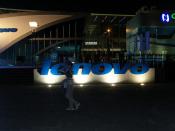According to Lenovo's 2004/2005 Annual Report, Lenovo has always aspired to become a global company. However, it had encountered obstacles for its further expansion and development. Firstly, though Lenovo is the largest PC maker in China with more than a quarter of the market share, it does little business outside the country. Secondly, the increasing fierce competition from aggressive foreign rivals such as Dell and HP in the past few years in Chinese market has put further pressures on Lenovo's margins (Electronics News, 2005), forcing it to expand its market base. Its growth rate in 2003 lagged behind the market growth rate. Thirdly, the company also suffered financial problems, earlier in the year 2004, Lenovo confessed that its performance over the past three years had fallen short of internal targets (Burt J.,2005). Fourthly, shares of the company dropped nearly 60 per cent in 2004. Therefore Lenovo sees the desperate need to refine its marketing strategy in order to maintain growth.
On April 30th, 2005, Lenovo completed the landmark acquisition with IBM's PC Division, hoping that it can borrow its established brand name to foster global expansion, establish credibility in foreign markets in a short time and to establish its own brand.
However, an interesting point to discuss is that if IBM's PC Division is so powerful, then why would IBM like to withdraw from this sector of business and transform into a service company instead? IBMs PC business unit lost $258 million in 2003 and $139 million in 2004. In less than four years, IBM lost nearly a billion dollars selling PC (Musthaler, L., 2005). In this article, I would study how Lenovo can succeed in the field where IBM failed. The marketing management issue in the buying out would be discussed in terms of what Lenovo...



Lenovo's point of differentiation
Good article. However, it has not yet answered the question on what is Lenovo's point of differentiation? Innovation? Efficiency? or both? or something else?
0 out of 0 people found this comment useful.